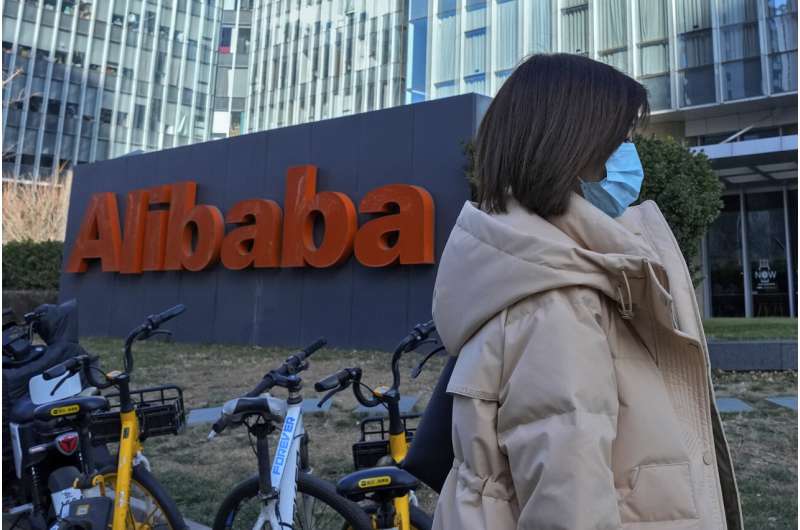A Chinese security guard rides past the logo for Chinese tech firm Alibaba in Beijing, China on Aug. 24, 2021. Shares of Chinese technology firms Alibaba and Tencent plunged Monday, July 11, 2022, a day after Chinese regulators fined their subsidiaries for not disclosing transactions and failing to comply with anti-monopoly rules. Credit: AP Photo/Ng Han Guan
Shares of Chinese technology firms Alibaba and Tencent fell sharply on Monday, a day after Chinese regulators fined their subsidiaries for not disclosing transactions and failing to comply with anti-monopoly rules.
E-commerce giant Alibaba's shares in Hong Kong fell 6.8%, while gaming and social media company Tencent Holdings sank 3.2%. The Hang Seng index declined 3%.
On Sunday, China's State Administration for Market Regulation published a list of 28 deals that violated anti-monopoly rules.
It included five of Alibaba's transactions and 12 of Tencent's. A wide-reaching crackdown on the technology sector has often hit stock prices in Hong Kong and Shanghai. For violations in each case, the maximum fine was 500,000 yuan ($74,500).
A wide-reaching crackdown on the technology sector has often hit stock prices in Hong Kong and Shanghai, though signs the authorities might be easing up spurred gains in recent months.
Alibaba's shares had risen 70% and Tencent's were up 18% since mid-March, before Monday's losses.
-
A woman wearing a face mask walks by the offices of Chinese e-commerce firm Alibaba in Beijing on Dec. 13, 2021. Shares of Chinese technology firms Alibaba and Tencent plunged on Monday, July 11, 2022, a day after Chinese regulators fined their subsidiaries for not disclosing transactions and failing to comply with anti-monopoly rules. Credit: AP Photo/Andy Wong
-
A worker wearing masks answer queries from visitors to the Tencent booth during the China International Fair for Trade in Services (CIFTIS) in Beijing on Sept. 6, 2021. Shares of Chinese technology firms Alibaba and Tencent plunged Monday, July 11, 2022, a day after Chinese regulators fined their subsidiaries for not disclosing transactions and failing to comply with anti-monopoly rules. Credit: AP Photo/Ng Han Guan
"The dip is likely to be temporary. The market was more wary about the U.S. raising interest rates so sharply, but it's just been overrun by the new fines," said Francis Lun, an investment manager and veteran market commentator in Hong Kong.
An increase in coronavirus cases that raised fears of more pandemic lockdowns in Shanghai also shook investor sentiment, he said.
© 2022 The Associated Press. All rights reserved. This material may not be published, broadcast, rewritten or redistributed without permission.

























